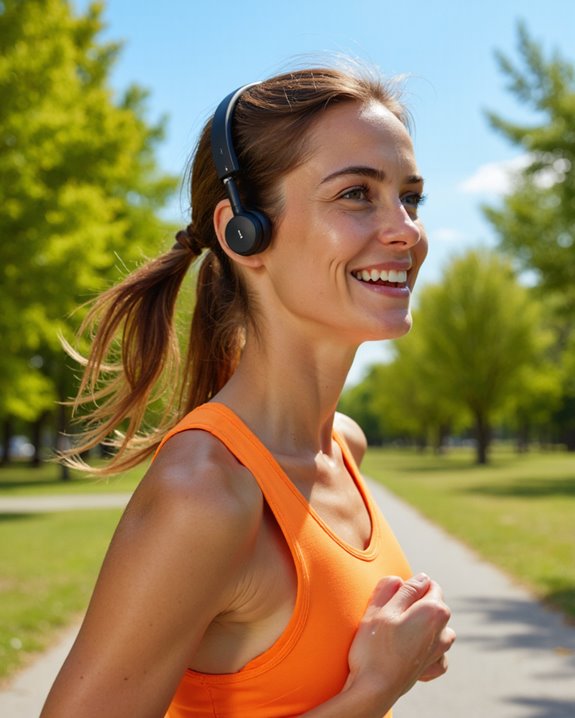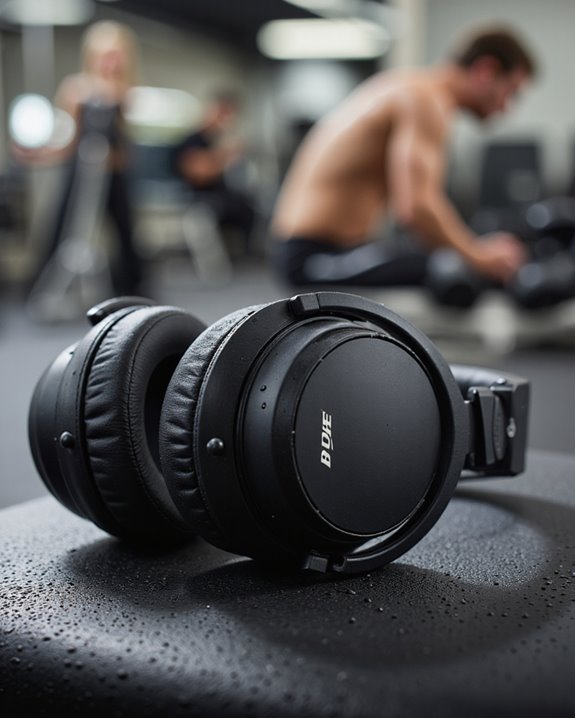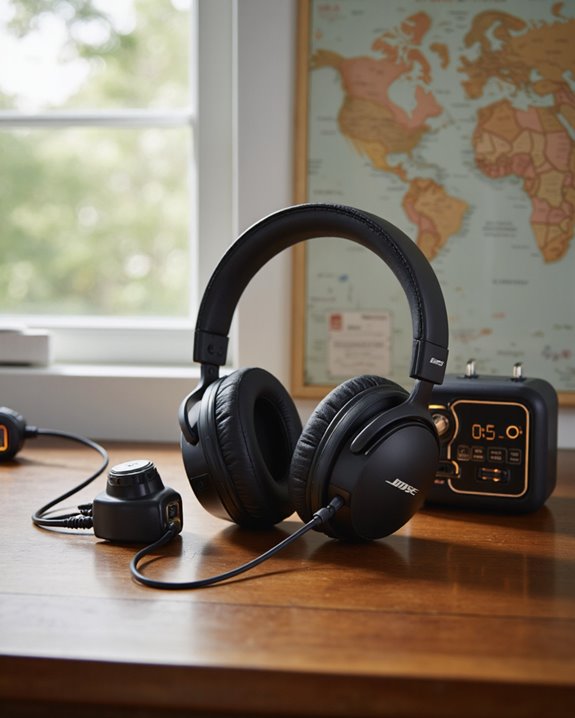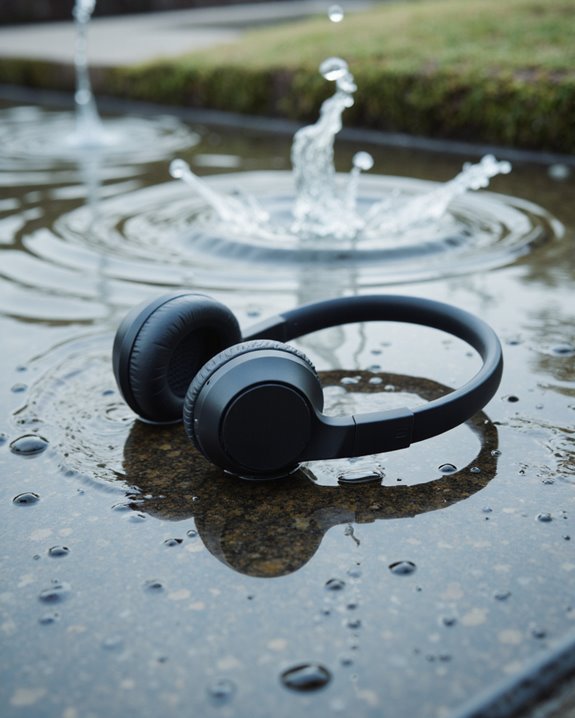As an Amazon Associate, we earn from qualifying purchases. Some links may be affiliate links at no extra cost to you. Although our opinions are based on curated research, we haven't used these products. Articles generated with AI.
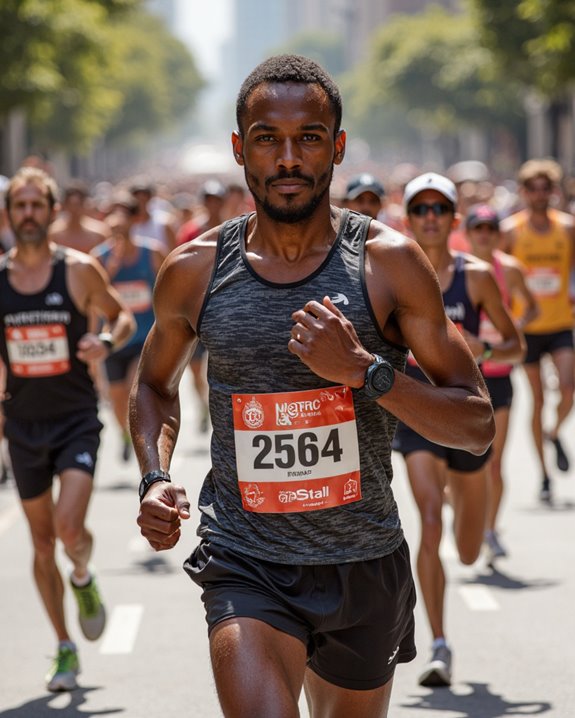
Can You Wear Headphones During a Marathon?
While running with headphones can boost motivation and help with pacing, we’ll need to check each marathon’s policy before race day, as many—like the Tokyo Marathon—prohibit headphones for safety and communication reasons. Event organizers prioritize our awareness of race instructions, course hazards, and emergency alerts, making headphone bans common at major races. Some smaller or non-competitive events may allow them, but it’s critical to review official guidelines. There are effective ways to adapt if headphones aren’t permitted.
Key Takeaways
- Many major marathons, such as the Tokyo Marathon, prohibit headphone use for safety and communication reasons.
- Some races allow headphones for non-competitive runners, but it’s essential to check each event’s specific policy beforehand.
- Headphones can diminish situational awareness, potentially causing you to miss important race instructions or alerts.
- Using headphones may increase the risk of accidents or even lead to disqualification in certain events.
- Training without headphones can help you adapt and stay focused if running in a race where they’re not permitted.
Benefits and Drawbacks of Running With Headphones
Although lacing up for a marathon with headphones might seem like a simple personal preference, the decision carries a range of technical and experiential implications for race day. Running with headphones and enjoying music while running can provide a measurable mental boost, helping us maintain focus and manage fatigue. Studies consistently show self-selected music improves endurance and perceived effort. However, these benefits come with trade-offs. Wearing headphones may compromise our ability to hear race announcements, instructions, or oncoming runners, increasing safety risks. This isolation can also reduce our sense of connection with fellow participants. Importantly, many events implement race rules that restrict or ban headphones, so it’s crucial we check the rules before race day to confirm compliance and safety.
Race Regulations on Headphone Use
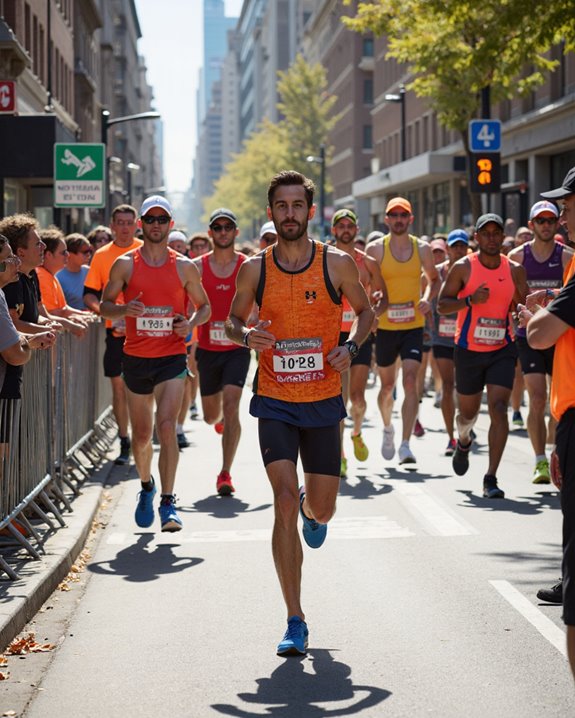
While it might seem like wearing headphones is a personal choice, race regulations often dictate otherwise, and the specifics can vary widely between events. Many major running events, such as the Tokyo Marathon, prohibit headphones due to safety concerns—most importantly, maintaining our awareness of surroundings. Official guidelines frequently stress that participants must stay alert to race communications, which headphones can impede. Race directors may enforce strict bans to facilitate clear instructions from course marshals, especially on crowded or shared routes. Although USATF rules since 2008 allow non-competitive runners to wear headphones, individual races may still restrict their use based on local safety policies. It’s essential we check each event’s headphone policy before registering, as the rules are not universal across marathons.
Safety Considerations for Marathon Participants

Because marathon courses often span busy city streets and involve thousands of participants, situational awareness becomes a vital aspect of race safety. When we consider safety considerations, it’s clear that wearing headphones can greatly impact our ability to respond to important audio cues. Race officials issue instructions, alert runners to hazards, and communicate changes on the course—all of which we need to hear to maintain a safe running experience. Headphones may block out these essential messages, as well as the sounds of approaching vehicles, other runners, or emergency alerts. Pre-race briefings reinforce the need for vigilance, reminding us that maintaining communication with fellow participants and support personnel is essential. Ultimately, prioritizing situational awareness helps us avoid incidents and enhances our overall marathon experience.
Why Some Races Ban or Discourage Headphones
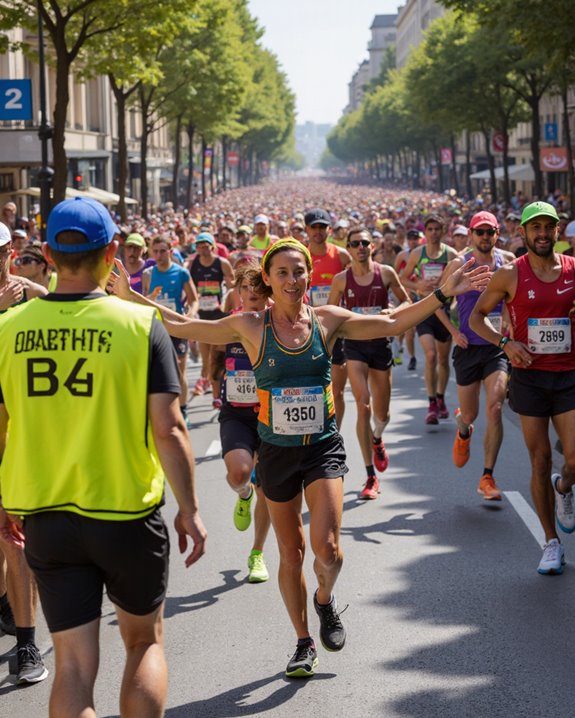
Given the importance of situational awareness on race day, it’s understandable why many marathons ban or discourage the use of headphones. When we’re wearing headphones, safety concerns increase—especially in crowded races or those sharing paths with vehicles. Audio cues, such as instructions from race officials or emergency alerts, can be missed if music drowns out important announcements. The USATF updated its rules in 2008 to permit headphones for non-competitive runners, but race directors retain authority to impose a ban for safety reasons. In large events, maintaining clear communication with course marshals is critical. Ultimately, the risk of accidents or disqualification rises if we’re not alert to our surroundings, so organizers often restrict headphones to protect all participants.
Adapting to Events That Prohibit Headphones
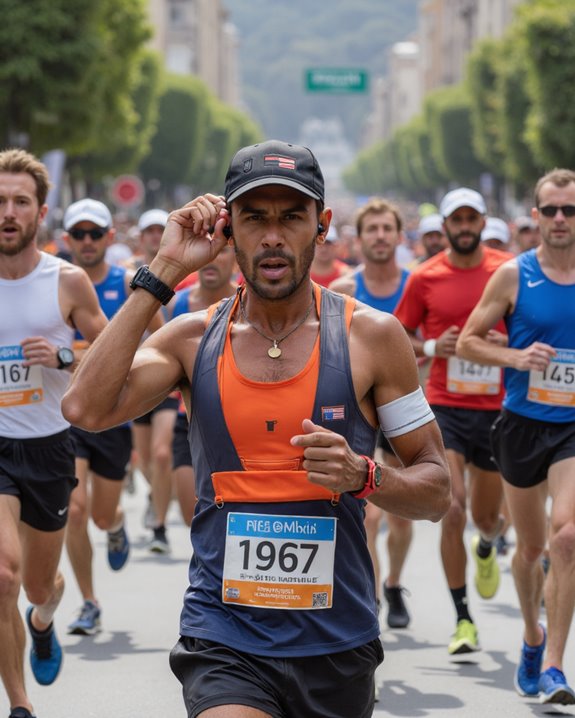
Although running without headphones may initially feel unfamiliar, adapting to events that prohibit them is both achievable and beneficial for marathon participants. To effectively adapt to races where we can’t wear headphones, we should incorporate training runs without music into our routines. This prepares us for race day conditions and builds mental resilience, improving exercise performance even in the absence of our usual auditory distractions. Engaging with fellow runners during the marathon can foster motivation and social connection, compensating for the lack of music. Practicing mindfulness—focusing on breathing, footsteps, and environmental sounds—further enhances our ability to maintain pace and concentration. By breaking the marathon into smaller mental segments, we make the distance manageable and maintain our motivation, ensuring a smoother adjustment to racing without music.
Choosing the Best Music for Your Training and Races

How do we select music that not only entertains but also actively supports our marathon training and race-day performance? When choosing the best music for running, we should focus on tracks that match our personal preferences, as research shows that listening to music we enjoy can boost motivation and enhance performance. Syncing songs with a tempo near 180 BPM is ideal, as this mirrors the stride rate of efficient runners and fosters consistent pacing, especially during marathon time. It’s beneficial to curate playlists for specific workouts—uplifting lyrics can help maintain motivation on long runs, while energetic tracks support intense intervals. Utilizing music streaming services streamlines playlist management, allowing us to customize selections for every training phase and race strategy, maximizing our running experience and endurance.
Tips for Enhancing Your Running Experience Without Headphones

While many runners rely on headphones to provide motivation and pacing cues, there are effective strategies for enhancing our running experience without audio support.
1. Train Without Music: Incorporate regular long runs without music. This helps us get accustomed to being able to hear our surroundings and builds mental resilience for race day.
2. Tune Into the Environment: Focus on ambient sounds—footsteps, breathing, and nature. This connection not only grounds us but also sharpens our awareness.
3. Segment the Course Mentally: Breaking the marathon into smaller sections allows us to stay motivated and maintain focus throughout the event.
4. Engage With Others: Interacting with fellow runners creates a supportive atmosphere and can provide a morale boost.
5. Use Rhythms: Rely on breathing and movement rhythms as cues for a steady pace, compensating for the lack of musical tempo.
Frequently Asked Questions
Do People Wear Headphones for Marathons?
As runners, we often see people wearing headphones during marathons, influenced by runner preferences, music motivation, and desire for personal focus. However, race environment and safety concerns mean headphone types and usage depend on the specific event’s rules.
Are Airpods Allowed in Marathon?
Like birds tuning into their favorite song, we might want to use AirPods, but AirPods regulations and headphone policies depend on marathon rules. Let’s check sound safety, race etiquette, and runner preferences before making our final decision.
Can You Listen to Music in a Marathon?
When we think about listening to music in a marathon, it’s important to take into account safety concerns, race motivation, and runner focus. Our music selection and sound preferences can impact performance, but we should always prioritize race rules and safety.
What Is Not Allowed in a Marathon?
When we join a marathon, there are things we can’t do due to race regulations, safety concerns, and runner etiquette. Following official guidelines protects everyone’s race experience and auditory awareness, especially when listening for important instructions or emergencies.

